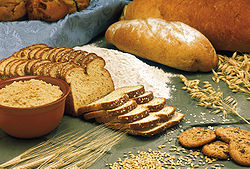Chadash

Grain products
|
|
| Halakhic texts relating to this article | |
|---|---|
| Torah: | Leviticus 23:14 |
| Mishnah: | Hallah 1:1, Orlah 3:9, Kiddushin 1:6, and Menahot 10:6-7 |
| Babylonian Talmud: | Menahot 68b, Kiddushin 37a-38a, Keritot 5a |
| Mishneh Torah: | Maachalot Assurot 10:2 |
| Shulchan Aruch: | Yoreh De'ah 293 |
| Other rabbinic codes: | Sefer ha-Chinuch mitzvot 303-305 |
In Judaism, Chadash (or Chodosh) (Hebrew: חדש; "new [grain]") is a concept within Kashrut (the Jewish dietary regulations), based on the Biblical requirement not to eat any grain of the new year (or products made from it) prior to the annual Omer offering on the 16th day of Nisan.
Grain products which are no longer affected by this law are referred to as Yashan (= old).
In Rabbinic Judaism, this requirement is restricted to the five classical grains of Judaism - Wheat, Barley, Oat, Spelt, and Rye; any of these grains (or products made from them) that are too "young" to pass the requirement are referred to in Judaism as Chadash ("new [grain]"). Additionally, the Rabbinic interpretation requires grain to have taken root prior to the Omer offering for it to become permitted; therefore, grains planted after Passover could only be consumed -at earliest- twelve months later.
Following the destruction of the Temple in Jerusalem, the Omer offering is no longer offered. Instead, the new grain becomes permissible following the date on which the offering was brought in ancient times. Chazal enacted a one-day further delay because of the extra day of holiday outside the Land of Israel.
The applicability of the Chadash rules to grain grown outside the Land of Israel is a subject of debate among halakhic authorities. The majority of medieval Jewish scholars (e.g. Moses Maimonides, the Rif, and the Rosh) forbade its consumption. The later codifiers of Jewish law for Ashkenazic and Sephardic Jewry followed suit, both Rabbi Moses Isserles and Rabbi Joseph Caro declaring the stringent position. A radically novel lenient approach was presented by Rabbi Yoel Sirkis who felt it is permissible if the grain originally belonged to a non-Jew. Additionally, the manner in which various foods have historically been available has meant that Jewish populations would need to risk starvation to pursue stringent compliance with this aspect of kashrut. These two factors led to a situation in which observation of the Yashan regulation was relatively limited until very recently (at least in the Ashkenazic community).
...
Wikipedia
